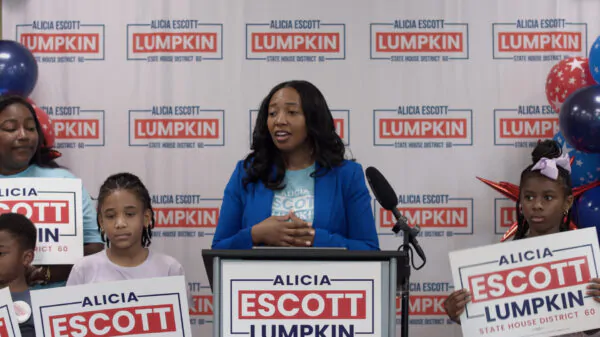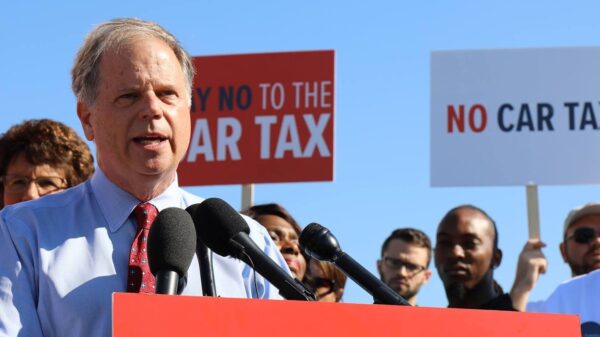A debate over the U.S. Senate’s filibuster rules is furiously raging as Senate Democrats seek to curtail the parliamentary device to pass its progressive agenda.
Republican Senate candidate Congressman Mo Brooks, R-Alabama, recently renewed his longtime call to end the U.S. Senate filibuster, a move that would surely be welcomed by Rep. Alexandria Ocasio-Cortez, D-New York, and Sen. Bernie Sanders, I-Vermont, who have both called for the rules change.
Brooks claims the procedure is an unconstitutional process that is “outdated, obstructionist, and impedes progress.” His rival for the Senate seat, Katie Britt, sees it as protection against a Democrat majority’s “recklessness” leading to an undermining of the foundations of the Republic.
As currently established, the filibuster effectively requires 60 votes to pass legislation through the Senate and is widely credited with keeping the country from swinging too far to either side of the political spectrum.
When running for the U.S. Senate in 2017, Brooks was a vocal supporter of ending the filibuster, arguing it would help Republicans when they are in the majority in Congress and simultaneously hold the White House.
In another pernicious flurry of rhetorical regurgitation, Brooks called the filibuster “an archaic accident of history created during the days of horse and buggy, and slavery.”
Liberals lately have echoed Brooks’ sentiment using similar language to castigate the filibuster, calling it a “relic of Jim Crow” and “racist.”
Brooks sees the Senate procedure not only as wrong but as extra-constitutional.
“The Senate filibuster rule is outdated, obstructionist, and impedes progress. There is no statute or provision in the Constitution that supports a filibuster,” Brooks stated in 2017.
In a recent radio interview with Jeff Poor on FM Talk 1065, asked if he stood by his 2017 position, Brooks responded in the affirmative.
“What do you say about the filibuster today versus back then? If you are in the Senate, is it something that should remain an institution or part of the U.S. Senate?” Poor asked.
“The filibuster is not a foundational principle,” Brooks replied. “The filibuster is a rule, a procedure, a process, and it has never worked as an offensive tool for conservatives over the last century.”
He then conceded it has worked as a “defensive tool” for conservatives – meaning it stops leftwing items from advancing.
However, Brooks argued that that is not a reason to keep the filibuster long-term.
“I’m one of those who thinks, well, if we have total control over everything, and this is our last shot to revive our foundational principles, by golly, don’t let the filibuster rule stand in the way,” Brooks stated. “But if we’re in the minority and it’s a defensive tool, then keep it.”
Poor then pointed out that if Republicans were to end the filibuster in the majority, it would not be available for them to use anymore when in the minority.
“Well, you can’t – I mean, given under this circumstance, either you get to keep it, or you don’t, because someday you might not be in power again,” Poor said.
Brooks reiterated, “Right now, we’re in the minority. Keep it.”
Poor responded, “So, it just depends on where you are politically?”
“Yeah, it depends on whether it helps or hurts you,” Brooks responded.
“But if you do, if you do away — say you do away with it — then you have the sort of scenario that you have right now in the future, would you find that to be a regret, or is it just…,” Poor began to ask before Brooks jumped back in.
“Once lost, it’s lost forever,” Brooks acknowledged while doubling down on his argument the filibuster favors Democrats.
Poor followed up once again in an attempt to get Brooks to clarify whether he’s in favor of ending the filibuster moving forward.
“So, just as a general principle, though, that you find a filibuster to be something that if you had to pick one way or another, it would be something to go? Not taking into account the political circumstances that we’re under right now. You would be leaning against the filibuster?” Poor asked.
Brooks responded by affirming his belief that conservatives should end the filibuster the next time they hold the White House and a majority in both the Senate and the House.
Presently, many Democrats share Brooks’ willingness to trash the filibuster giving them an opportunity to pass a progressive agenda.
In contrast, Senatorial candidate Britt spoke in favor of keeping the filibuster on the same radio program the week prior to Brooks’ appearance.
“I think if we did not have the filibuster, then we would see the Democrats’ endless spending, we would see them moving further and further toward socialism,” Britt emphasized, adding that Democrats would likely pack the Supreme Court and expand abortion rights if the filibuster was gone.
“We do not want to see them force these liberal policies that are not the will of the people down our throat when they have a slim margin,” she added.
Britt reiterated that the importance of the filibuster is being displayed right now, saying, “otherwise the Democrats would change this country and it would be changed in a way in which it would take us years and years and years to roll that back.”
“[M]aking sure that we have safeguards against their recklessness is important,” she said.
Far too often, the media and the public focus their attention on the political horse race while ignoring the fundamental policy differences between the candidates.
Once again, Brooks seems to be double-minded or, at the least, uses double-speak to state his position, leaving voters to determine what he stands for other than talk.
Contrary to Brooks’ assertion, the tactic of using long speeches to delay action on legislation was witnessed during the very first session of the U.S. Senate. Pennsylvania Sen. William Maclay wrote in his diary that on Sept. 22, 1789, the “design of the Virginians … was to talk away the time, so that we could not get the bill passed,” according to Senate history.
“Whether praised as the protector of political minorities from the tyranny of the majority, or attacked as a tool of partisan obstruction, the right of unlimited debate in the Senate, including the filibuster, has been a key component of the Senate’s unique role in the American political system,” according to the Senate’s powers and procedures.





















































